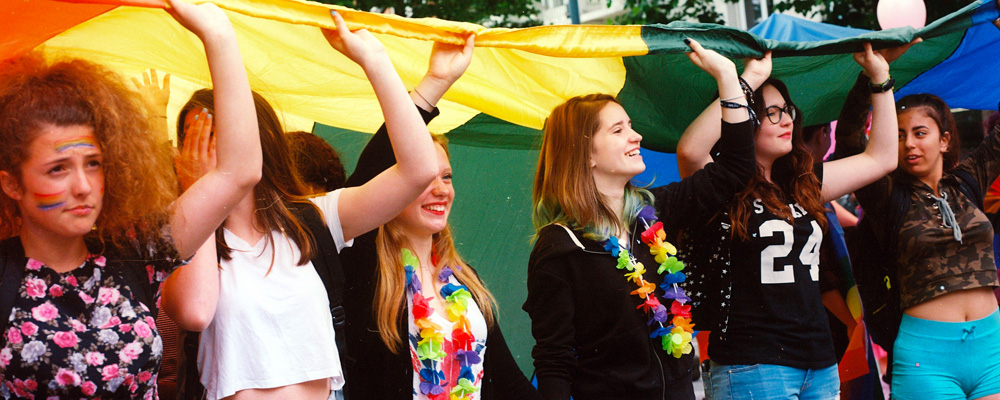
Sexual assault, intimate partner violence, and sexual harassment can happen to anyone, regardless of gender, sexual orientation or gender identity. Women of all sexual identities bear the disproportionate burden of gender-based violence, but we also must recognize the diverse experiences of survivors who represent any and all genders, gender identities and sexual orientations. LGBTQIA, or Lesbian, Gay, Bisexual, Transgender, Queer, Intersex, Asexual and gender non-conforming communities often represent a direct contradiction to expected and assigned gender roles in society, and as a result are at heightened risk of gender-based violence. Some sexual assault and harassment may be directed at individuals as a hate crime specifically because of their identities, other times, abusers may use the victim’s identity, status of being “out” or traditional gender norms as a way to maintain power and control.
The numbers for dating/domestic violence are staggering: one in three women and one in four men are victims at some point in their lifetime and the impact can be pervasive and devastating. However, little is openly discussed regarding dating/domestic violence in LGBTQIA relationships.
It is important to know the facts:
- The rate of domestic violence and statistics about abuse within the LGBTQIA community are difficult to determine because of the high number of unreported cases. An LGBTQIA person may be less likely to report an assault or get help out of fear that they will be blamed for the assault because of their sexual orientation or gender identity by friends, family, or officials.
- According to the Centers for Disease Control and Prevention (CDC), although it is widely believed that only straight women are victims of domestic violence, it actually occurs in LGBTQIA relationships at similar or higher rates than in the general population.
- Some studies suggest that 33% of lesbian women are physically abused by an intimate partner; 50% of bisexual women are physically abused by an intimate partner; and 17% of gay men are physically abused by an intimate partner.
- Studies also suggest that half of trans/transgender individuals and bisexual women will experience sexual violence at least once in their lifetimes.
- The abuse experienced by LGBTQIA individuals can be equally or even more damaging than abuse experienced by the straight population. Studies show that gay men and bisexual women are more likely to experience severe physical violence than their straight counterparts.
- Psychological violence (including but not limited to name calling, insulting, humiliating or controlling a partner) is just as serious as physical or sexual violence. Threats to out another person’s sexual orientation or gender identity as a means of control are unique to the LGBTQIA community.
The LGBTQIA victims face unique barriers to finding help. They may have to overcome homophobia and/or transphobia when trying to find help for the domestic violence they are experiencing. Lack of focused services, discrimination from law enforcement and isolation are just a few of those barriers.
Resources for the LGBTQIA Community
WEBSITE
WEBSITE
FORGE is a national transgender anti-violence organization, founded in 1994. Since 2009, they have been federally funded to provide direct services to transgender, gender non-conforming and gender non-binary survivors of sexual assault.
Gay, Lesbian, Bisexual & Transgender (GLBT) National Hotline offers peer counseling on a variety of issues, including domestic violence within the GLBT community.
ADMINISTRATIVE PHONE: (415) 355-0003
EMAIL: info@glbtnationalhelpcenter.org
WEBSITE
Stop Abuse for Everyone (SAFE) is a human rights organization that provides services, publications, and training to serve those who typically fall between the cracks of domestic violence services. These groups include straight men, gays and lesbians, teens, the elderly, and immigrants.
Center on Halsted Anti-Violence Program – empowers lesbian, gay, bisexual, transgender, queer, and HIV-affected communities and allies to end all forms of violence through organizing and education, and supports survivors through counseling and advocacy.
WEBSITE
The Trevor Project is an American nonprofit organization founded in 1998. It focuses on suicide prevention efforts among lesbian, gay, bisexual, transgender, queer, and questioning (LGBTQ) youth. Through a toll-free telephone number, it operates The Trevor Lifeline, a confidential service that offers trained counselors.
Trans Lifeline is a grassroots hotline and microgrants 501(c)(3) non-profit organization offering direct emotional and financial support to trans people in crisis – for the trans community, by the trans community.
WEBSITE
